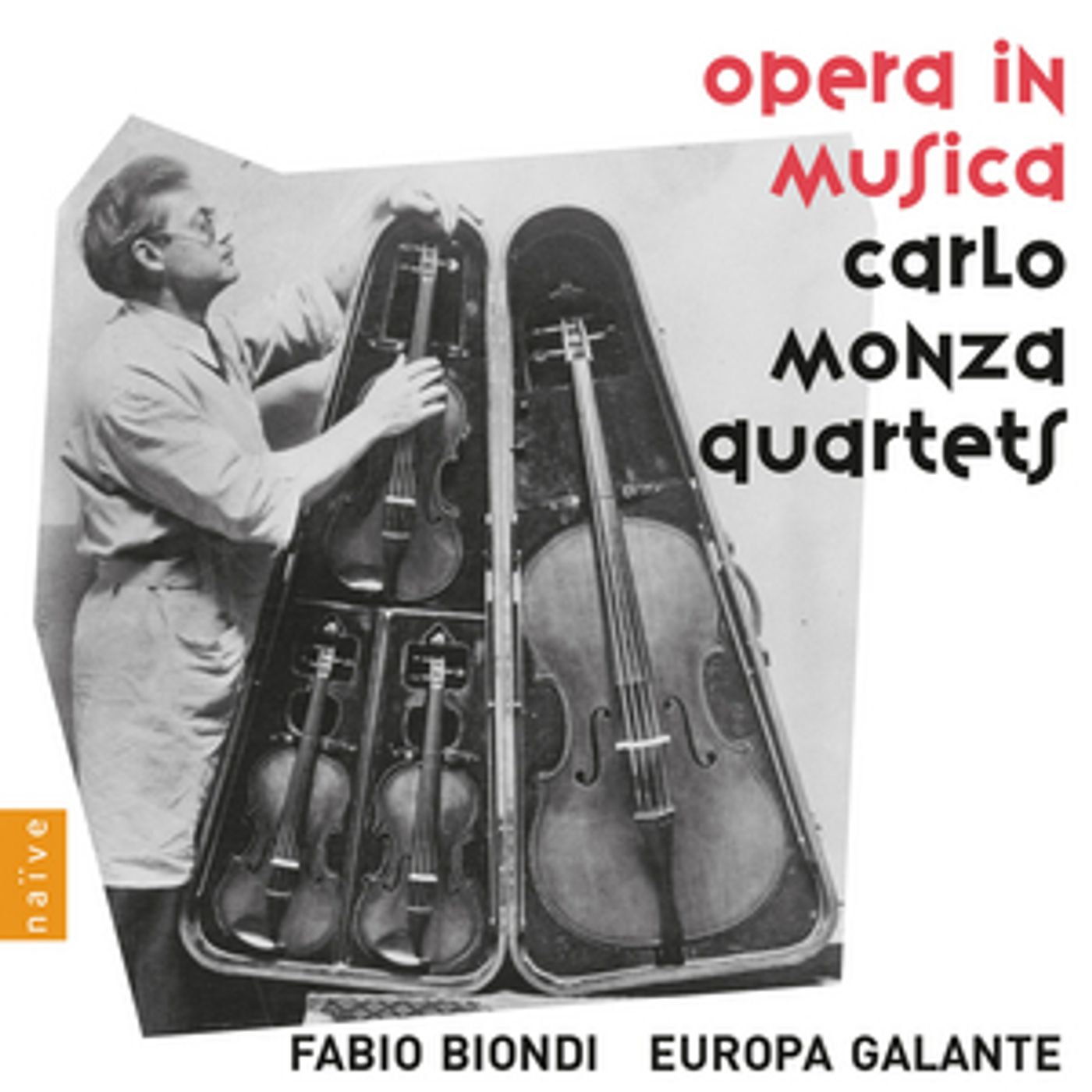Fabio Biondi Uncovers Carlo Monza Quartets On Opera In Musica; Out April 22
With their joyful tone and flirtatious style, Monza's string quartets could easily be taken for youthful works by Mozart.

On April 22nd, Naïve Classiques will release an album of six never-before recorded string quartets by 18th century Milanese composer Carlo Monza, performed by violinist Fabio Biondi and members of his Europa Galante ensemble: violinist Andrea Rognoni, violist Stefano Marcocchi, and cellist Alessandro Andriani.
With their joyful tone and flirtatious style, Monza's string quartets could easily be taken for youthful works by Mozart, which is hardly surprising, as the 14-year-old Mozart was in Milan at the time, immersed in its music and its composers: Sammartini, Lampugnani, and Monza.
Fabio Biondi discovered the virtually unknown Carlo Monza while researching Mozart's travels in Italy. "I was trying to find out what characterized the writing of the composers in the court of the Duke of Milan, and how Mozart, then a young man of fourteen, had understood this himself so he would be accepted by local audiences," writes Biondi. "I therefore began by looking at the Milanese composers of the time, which basically included three names: Giovanni Battista Sammartini, undoubtedly the most important, Giovanni Battista Lampugnani and Carlo Monza." A decade ago, Biondi chanced upon a catalogue of manuscripts stored in a private library, including the six string quartets of Monza. Frustratingly, the library denied Biondi access to them, but after a long search he discovered a copy was in the Bibliothèque Nationale de France. "Monza's music is so beautiful and reflects so accurately the Milanese school in the second half of the eighteenth century that I wanted to make a recording of it," says Biondi.Fabio Biondi, Violin
Andrea Rognoni, Violin
Stefano Marcocchi, Viola
Alessandro Andriani, Cello
Quartet in C Major "gli amanti rivali"
Quartet in D Major "opera in musica"
Quartet in F Major "la fucina di vulcano"
Quartet in B-Flat Major "il giuocatore" Quartet in G minor "divertimento notturno"
Quartet in E-Flat Major "la caccia" About Fabio Biondi
In 1989, following extensive work with specialist ensembles including Les Musiciens du Louvre and The English Concert, Fabio Biondi founded Europa Galante, which quickly became the foremost Italian period ensemble. Fabio Biondi and his ensemble have forged a reputation for "fresh, vibrant performances" (New York Times) and breathe new life into Baroque, Classical and early Romantic repertoire, performing at leading international festivals and venues including recently the Berlin Pierre Boulez Saal, Elbphilharmonie Hamburg, Wiener Konzerthaus, Enescu Festival and Edinburgh International Festival.
Fabio Biondi brings this authentic and engaging approach to modern symphony and chamber orchestras, which he both conducts and directs from the violin. Recent and future highlights include the New York Philharmonic, Chicago Symphony, Hong Kong Philharmonic, Orchestra dell'Accademia Nazionale di Santa Cecilia, RAI Torino, NDR Radiophilharmonie, Frankfurt Radio Symphony, Finnish Radio Symphony, Mahler Chamber orchestras and the Mozarteumorchester Salzburg. He was Artistic Director for Baroque Music with the Stavanger Symphony Orchestra for eleven years until 2016. Fabio Biondi's passion for opera takes him to major theatres including Zurich Opera, Berlin's Staatsoper unter den Linden and in 2020 to the Grand Théâtre de Genève for Luk Perceval's new production of Mozart Die Entführung aus dem Serail. In 2015-18 he was Music Director of Valencia's Palau de les Arts Reina Sofia, where he conducted productions of Donizetti, Rossini, Haydn and Verdi Il Corsaro. As a violinist, he performs in recitals across the world including at Carnegie Hall, Wigmore Hall, Auditorio Nacional de Música Madrid and Cité de la Musique. His wide-ranging discography has earned a growing list of important awards, including several BBC editor's choice awards, Echo Klassics, Diapason and three GRAMMY Award nominations. Fabio Biondi has been an academician of the Accademia Nazionale di Santa Cecilia since 2011. In 2015, he was made officer of the French Ordre des Arts et Lettres by the French Ministry of Culture, and in 2019, the Polish government awarded him the medal of Courage and Veracity in recognition of his outstanding cultural achievements, particularly for his new interpretation of works by Stanisław Moniuszko during his long collaboration with the Warsaw Chopin Festival.Videos

